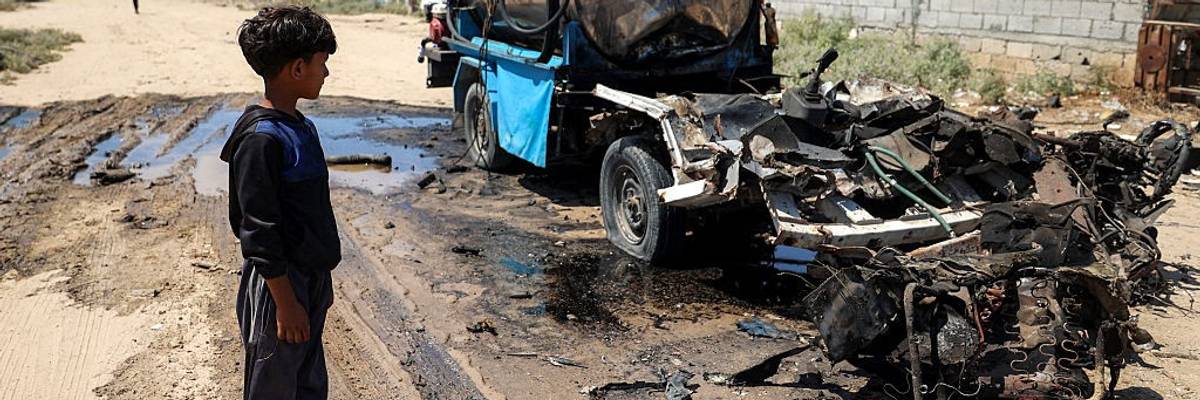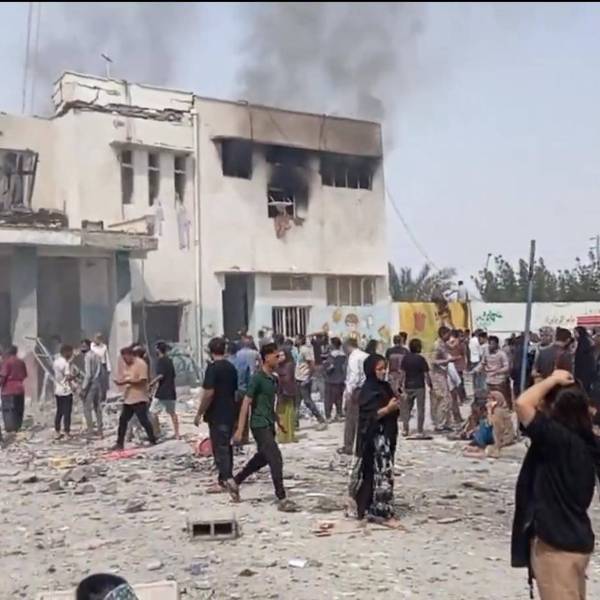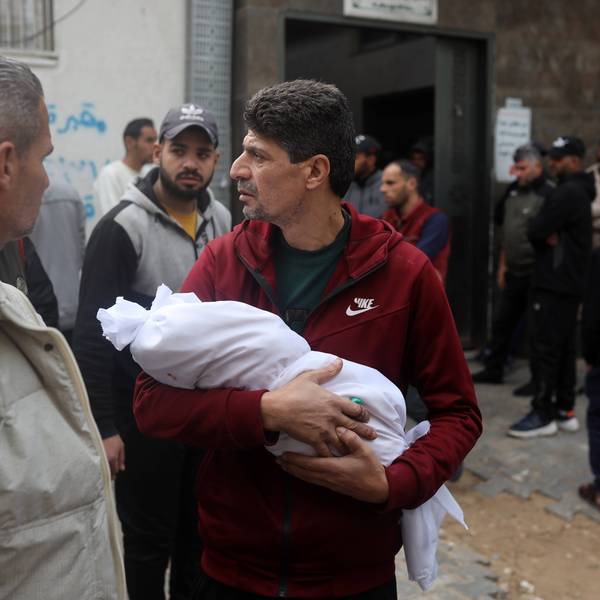
A boy stands near a destroyed mobile water cistern that Israeli forces bombed in the central Gaza Strip on July 14, 2025.
'Horrific': Israeli Military Kills Seven Children in Latest Attack on Water Distribution Site
Gaza's Government Media Office said Israeli forces have killed more than 700 people at water distribution sites since October 2023.
Israeli forces on Sunday killed at least 10 people—most of them children—as they attempted to obtain water at a distribution point in central Gaza, an attack that came as Israel's military was accused of intentionally depriving Palestinians of access to water as part of its U.S.-backed genocidal assault on the enclave.
The attack on Sunday killed seven children and injured more than a dozen people, drawing international outrage.
"Yet again we're seeing horrific reports of the killing of seven children in Gaza, this time as they were waiting for water at a distribution site," said Catherine Russell, executive director of the United Nations Children's Fund. "This comes just days after several children and women were killed waiting for nutritional supplies."
"The Israeli authorities must urgently review the rules of engagement and ensure full compliance with international humanitarian law, notably the protection of civilians, including children," Russell added. "UNICEF calls for an immediate and lasting cease-fire, aid at scale, and release of hostages."
The Israeli military acknowledged that it carried out the attack but denied it was trying to hit the water distribution point, claiming that a "technical error" caused the missile to miss its purported target—an Islamic Jihad militant—by dozens of meters.
Gaza's Government Media Office said in a statement early Monday that Israeli forces have killed more than 700 people in more than 100 attacks on water distribution sites since October 2023. The media office also said the Israeli government has prevented 12 million liters of fuel from entering the enclave per month, "the minimum amount needed to operate water wells, sewage treatment plants, waste collection vehicles, and other vital sectors."
"The Gaza Strip is today witnessing a major crime of deprivation of water, perpetrated deliberately and systematically by the Israeli occupation, amidst complete international silence and the direct and indirect participation of European and Western countries implicated in supporting or complicit in the crime of genocide," the office said.
Leading humanitarian organizations, including Oxfam and Human Rights Watch (HRW), have also accused the Israeli government of using water as a weapon of war in the Gaza Strip by cutting off supply and decimating the enclave's existing infrastructure, including wells and desalination plants.
The International Rescue Committee said last week that Gaza's "entire water system has broken down" and warned that "there is simply not enough clean water to meet the needs of the population in Gaza."
"When clean water is unavailable, the consequences extend far beyond thirst; families are forced to rely on unsafe water sources for cooking, cleaning, and bathing, heightening the risk of disease outbreaks like skin conditions, diarrhea, and hepatitis," the group said. "This compounds the burden on Gaza's collapsing health system, particularly in overcrowded shelters with limited hygiene options."
Israeli forces have also been massacring civilians at food distribution sites in recent weeks as famine spreads throughout Gaza.
The United Nations said on Friday that it recorded 798 killings at food distribution locations in Gaza between May 27 and July 7, with the overwhelming majority occurring in the vicinity of sites managed by the U.S.- and Israel-backed Gaza Humanitarian Foundation.
"They have a choice between being shot or being fed," said Ravina Shamdasani, a spokesperson for the U.N. Human Rights Office.
An Urgent Message From Our Co-Founder
Dear Common Dreams reader, The U.S. is on a fast track to authoritarianism like nothing I've ever seen. Meanwhile, corporate news outlets are utterly capitulating to Trump, twisting their coverage to avoid drawing his ire while lining up to stuff cash in his pockets. That's why I believe that Common Dreams is doing the best and most consequential reporting that we've ever done. Our small but mighty team is a progressive reporting powerhouse, covering the news every day that the corporate media never will. Our mission has always been simple: To inform. To inspire. And to ignite change for the common good. Now here's the key piece that I want all our readers to understand: None of this would be possible without your financial support. That's not just some fundraising cliche. It's the absolute and literal truth. We don't accept corporate advertising and never will. We don't have a paywall because we don't think people should be blocked from critical news based on their ability to pay. Everything we do is funded by the donations of readers like you. Will you donate now to help power the nonprofit, independent reporting of Common Dreams? Thank you for being a vital member of our community. Together, we can keep independent journalism alive when it’s needed most. - Craig Brown, Co-founder |
Israeli forces on Sunday killed at least 10 people—most of them children—as they attempted to obtain water at a distribution point in central Gaza, an attack that came as Israel's military was accused of intentionally depriving Palestinians of access to water as part of its U.S.-backed genocidal assault on the enclave.
The attack on Sunday killed seven children and injured more than a dozen people, drawing international outrage.
"Yet again we're seeing horrific reports of the killing of seven children in Gaza, this time as they were waiting for water at a distribution site," said Catherine Russell, executive director of the United Nations Children's Fund. "This comes just days after several children and women were killed waiting for nutritional supplies."
"The Israeli authorities must urgently review the rules of engagement and ensure full compliance with international humanitarian law, notably the protection of civilians, including children," Russell added. "UNICEF calls for an immediate and lasting cease-fire, aid at scale, and release of hostages."
The Israeli military acknowledged that it carried out the attack but denied it was trying to hit the water distribution point, claiming that a "technical error" caused the missile to miss its purported target—an Islamic Jihad militant—by dozens of meters.
Gaza's Government Media Office said in a statement early Monday that Israeli forces have killed more than 700 people in more than 100 attacks on water distribution sites since October 2023. The media office also said the Israeli government has prevented 12 million liters of fuel from entering the enclave per month, "the minimum amount needed to operate water wells, sewage treatment plants, waste collection vehicles, and other vital sectors."
"The Gaza Strip is today witnessing a major crime of deprivation of water, perpetrated deliberately and systematically by the Israeli occupation, amidst complete international silence and the direct and indirect participation of European and Western countries implicated in supporting or complicit in the crime of genocide," the office said.
Leading humanitarian organizations, including Oxfam and Human Rights Watch (HRW), have also accused the Israeli government of using water as a weapon of war in the Gaza Strip by cutting off supply and decimating the enclave's existing infrastructure, including wells and desalination plants.
The International Rescue Committee said last week that Gaza's "entire water system has broken down" and warned that "there is simply not enough clean water to meet the needs of the population in Gaza."
"When clean water is unavailable, the consequences extend far beyond thirst; families are forced to rely on unsafe water sources for cooking, cleaning, and bathing, heightening the risk of disease outbreaks like skin conditions, diarrhea, and hepatitis," the group said. "This compounds the burden on Gaza's collapsing health system, particularly in overcrowded shelters with limited hygiene options."
Israeli forces have also been massacring civilians at food distribution sites in recent weeks as famine spreads throughout Gaza.
The United Nations said on Friday that it recorded 798 killings at food distribution locations in Gaza between May 27 and July 7, with the overwhelming majority occurring in the vicinity of sites managed by the U.S.- and Israel-backed Gaza Humanitarian Foundation.
"They have a choice between being shot or being fed," said Ravina Shamdasani, a spokesperson for the U.N. Human Rights Office.
Israeli forces on Sunday killed at least 10 people—most of them children—as they attempted to obtain water at a distribution point in central Gaza, an attack that came as Israel's military was accused of intentionally depriving Palestinians of access to water as part of its U.S.-backed genocidal assault on the enclave.
The attack on Sunday killed seven children and injured more than a dozen people, drawing international outrage.
"Yet again we're seeing horrific reports of the killing of seven children in Gaza, this time as they were waiting for water at a distribution site," said Catherine Russell, executive director of the United Nations Children's Fund. "This comes just days after several children and women were killed waiting for nutritional supplies."
"The Israeli authorities must urgently review the rules of engagement and ensure full compliance with international humanitarian law, notably the protection of civilians, including children," Russell added. "UNICEF calls for an immediate and lasting cease-fire, aid at scale, and release of hostages."
The Israeli military acknowledged that it carried out the attack but denied it was trying to hit the water distribution point, claiming that a "technical error" caused the missile to miss its purported target—an Islamic Jihad militant—by dozens of meters.
Gaza's Government Media Office said in a statement early Monday that Israeli forces have killed more than 700 people in more than 100 attacks on water distribution sites since October 2023. The media office also said the Israeli government has prevented 12 million liters of fuel from entering the enclave per month, "the minimum amount needed to operate water wells, sewage treatment plants, waste collection vehicles, and other vital sectors."
"The Gaza Strip is today witnessing a major crime of deprivation of water, perpetrated deliberately and systematically by the Israeli occupation, amidst complete international silence and the direct and indirect participation of European and Western countries implicated in supporting or complicit in the crime of genocide," the office said.
Leading humanitarian organizations, including Oxfam and Human Rights Watch (HRW), have also accused the Israeli government of using water as a weapon of war in the Gaza Strip by cutting off supply and decimating the enclave's existing infrastructure, including wells and desalination plants.
The International Rescue Committee said last week that Gaza's "entire water system has broken down" and warned that "there is simply not enough clean water to meet the needs of the population in Gaza."
"When clean water is unavailable, the consequences extend far beyond thirst; families are forced to rely on unsafe water sources for cooking, cleaning, and bathing, heightening the risk of disease outbreaks like skin conditions, diarrhea, and hepatitis," the group said. "This compounds the burden on Gaza's collapsing health system, particularly in overcrowded shelters with limited hygiene options."
Israeli forces have also been massacring civilians at food distribution sites in recent weeks as famine spreads throughout Gaza.
The United Nations said on Friday that it recorded 798 killings at food distribution locations in Gaza between May 27 and July 7, with the overwhelming majority occurring in the vicinity of sites managed by the U.S.- and Israel-backed Gaza Humanitarian Foundation.
"They have a choice between being shot or being fed," said Ravina Shamdasani, a spokesperson for the U.N. Human Rights Office.

